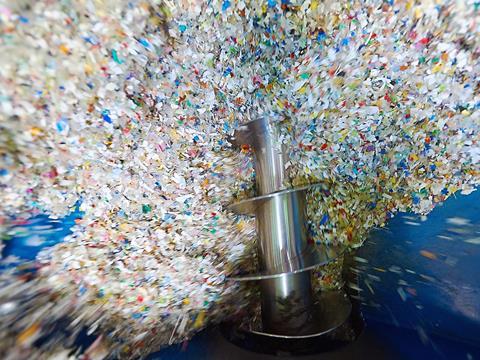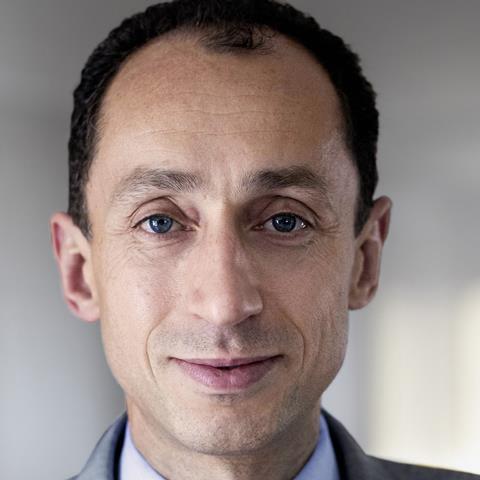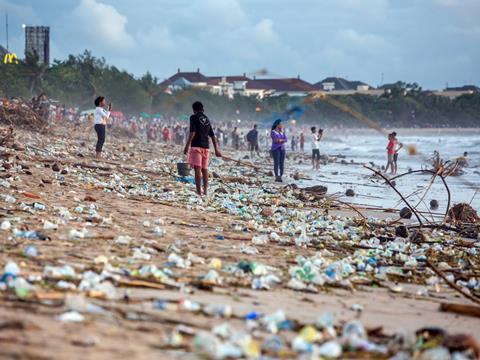
A common denominator in several of the recent circular economy collaborations we have reported on is the France-headquartered waste management giant Veolia. In addition to its bilateral initiatives with Unilever and Tetra Pak, Veolia was a signatory to the Alliance to End Plastic Waste organisation, launched in January. Tim Sykes interviewed Laurent Auguste, Veolia’s senior EVP, development innovation & markets.
In October last year Unilever and Veolia unveiled an international collaboration partnership to help create a circular economy on plastics. The work will focus on implementing used packaging collection solutions, adding recycling capacity and developing new processes and business models.
“There is intense pressure for a brand like Unilever to recycle more of its plastic packaging and it has published global commitments,” Laurent Auguste told Packaging Europe. “To realise its 2025 commitments, collaboration across the value chain is essential to achieve the various requirements: you need the technology for recycling, but before this there’s a need for adequate collection and sorting infrastructure. Should a brand wait for infrastructure or should it be proactive?”
Increasingly, leading stakeholders in the packaging value chain are choosing the latter option. The month following the Unilever announcement, Veolia joined forces with Tetra Pak in a partnership that will see PolyAl extracted from beverage cartons and converted into raw materials for applications within the plastic industry. It is claimed that the initiative, which is projected to make Tetra Pak’s cartons fully recyclable in the EU by 2025 and will be rolled out globally, will double the overall value of used liquid cartons.
Reverse innovation
The Unilever collaboration, by contrast, will have an initial focus on south and south east Asia with a view to applying the lessons it learns across more developed economies. The objectives of this initiative are on a broader scale, with the potential of transforming the waste management landscape in some of the countries from which the most packaging waste is leaking into the oceans. Veolia and Hindustan Unilever will run pilot projects to identify solutions to improve the effectiveness of existing collection systems. Meanwhile, there will be work on introducing new recycling technologies in south east Asia, and connecting with other players in the value chain to find new solutions, potentially including chemical recycling. As well as figuring out what’s required from a waste management point of view, the partnership will join the dots to consider eco-design that fits the emerging infrastructure.

If south and south east Asia are in urgent need of waste management, the regions also serve as a kind of blank canvas on which better ideas can be devised. “This is a fantastic opportunity for reverse innovation,” Laurent observed. “We’re all very familiar with the various, established systems that are in place in Europe, where lots of items go in the recycling bin and some of them are sorted out for recycling the sorting plant. In somewhere like Indonesia where there is little existing infrastructure we have an opportunity to think in a more disruptive way – to be closer to the consumer, to recognise the value of the material, and to involve the rest of the value chain. Perhaps we can come up with something that’s more cost efficient, because people are more involved in the sorting, and also more technologically efficient.”
Lack of existing systems often make less developed regions quicker to embrace new technologies that pioneer the way for the global North to follow. In particular, digital technologies may offer a powerful tool.
“These countries could be the scene for interesting developments around digital platforms that engage and connect consumers with the value chain to create a more fluid and dynamic system that responds to the needs of the circular economy,” Laurent remarked. “A few years ago when I was in China I found it took weeks to get a landline, but just minutes to get a cell phone – so of course many people skipped the landline and went straight to the cell phone. We might see a similar thing with collection and recycling in Asian countries: innovation emerging that leapfrogs what the so-called developed countries are doing and benefiting the whole world.”
Pre-competitive
The Veolia name has more recently still appeared as one of thirty initial signatories to the cross value chain Alliance to End Plastic Waste (AEPW), which has committed over a billion dollars to end plastic waste in the environment. The global Alliance is intended to develop and bring to scale solutions that minimise and manage plastic waste and promote solutions for used plastics by helping to enable a circular economy. This can be seen as a complementary initiative to the New Plastic Economy (of which Veolia is also a founding supporter): building upon NPE’s layer of policy pledges with concrete steps on the ground.
The AEPW will partner with cities to design integrated waste management systems in large urban areas where infrastructure is lacking, especially those along rivers significantly associated with transporting plastic waste into the ocean. It will also fund The Incubator Network by Circulate Capital to develop and promote technologies and business models preventing ocean plastic waste and improving waste management. An open source, global information project will be developed to support waste management projects. The Alliance will also foster capacity building collaboration with intergovernmental organisations such as the United Nations to conduct joint workshops and training for government officials and community-based leaders and support Renew Oceans to aid localised investment and engagement.

“We need to mobilise all actors in the value chain,” Laurent said. “In addition to the brands and the recyclers, we need CEO-level involvement on the part of the plastics and petrochemical companies. The threats we face are global, and require systemic changes, which in turn necessitates a pre-competitive environment, in which competing brands, competing chemical companies, and competing waste management companies join forces.”
Public / private
In the present time, when there is such European public concern about plastics, we see a curious mixture of regulatory pressure within Europe and initiatives driven by the private sector that can impact more directly on the parts of the planet most in need of waste management systems.
“Regulation is essential for pushing the circular economy in the right direction,” Laurent observed. “However, civil society expects things faster than regulators can make them happen. So there’s also pressure on businesses to have a kind of licence to operate. In countries such as Indonesia it will be very interesting to see what which direction they take. Will they emulate the European model of public sector EPR-type rules or will they opt for private sector led initiatives? I’m tempted to think they should choose the second. You can always tax industry and raise some money, but can you guarantee that will be channelled into effective solutions? If you want the required speed and impact, there’s an opportunity to let the private sector come up with solutions and do things in a smarter way. With the right blend of pressure and incentives, we can mobilise and show new ways forward.”
Amid a flurry of technological advances in design for recyclability, sorting and recycling, Laurent Auguste sees industry collaboration as the game-changing innovation: the realisation that transformative change can be made and value shared when market leaders come together to figure out solutions.
“We’ll only break out of the linear economy if we also break down the silos that we’ve built over time. We’re seeing this change in attitude taking place in plastics – and we need the same attitude across the whole of the circular economy.”
As if ocean plastics weren’t a weighty enough challenge in and of itself, this achievement could have wider implications: “We need the same attitude shift in order to tackle climate change,” Laurent concluded. “Imagine the impact if we can send the message that we are able to mobilise ourselves - to change the game and make a difference.”














